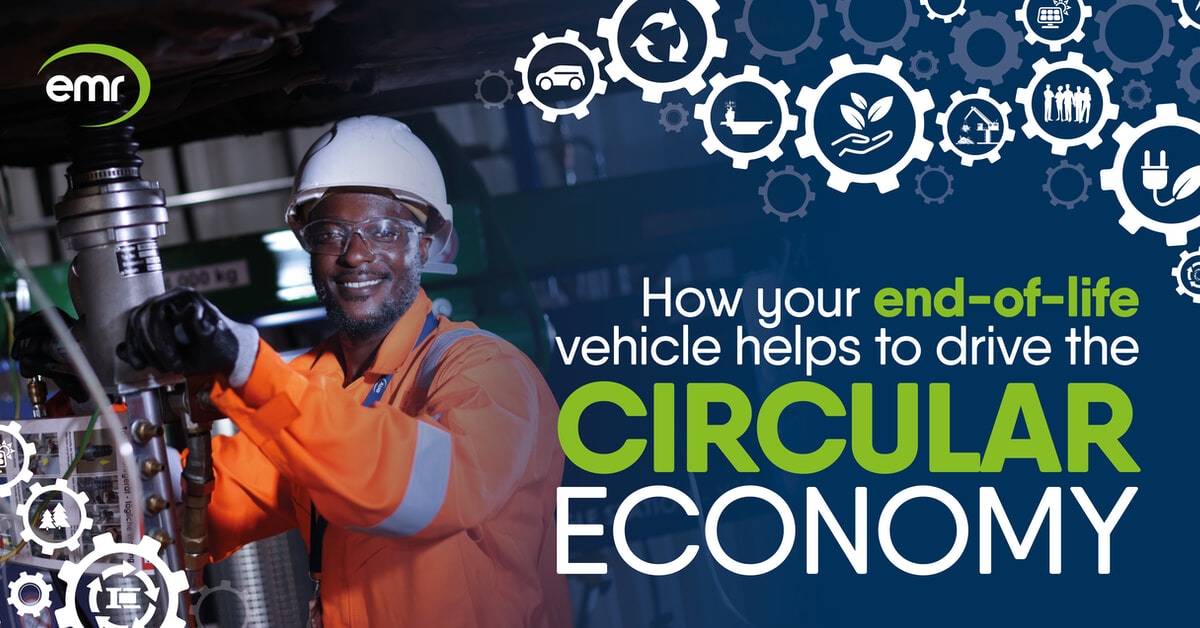How your end-of-life vehicle helps to drive the circular economy
Whether you’re looking to help fund the purchase of your next car, planning on a greener public transport future or simply appreciate the convenient and friendly service our teams provide, there are many reasons to bring your end-of-life vehicle (ELV) to your local EMR site.
But did you know that recycling an ELV with EMR is also contributing to the circular economy?

By David Holdcroft, Commercial Director, EMR
For decades manufacturers have relied on virgin metals and plastics to produce everything from domestic appliances to new vehicles. Extracting these materials destroys natural habitats, produces huge amounts of pollution, and will eventually leave us with no new metal and plastic full stop.
By using state-of-the-art technology, EMR can take the materials typically found inside an ELV, recycle them, and feed them back into the manufacturing of toasters, kettles, new cars and even aircraft carriers.
This process of reusing material that might otherwise be thrown away is called the circular economy.
And, it turns out, your old vehicle is a particularly good source of the materials manufacturers require frequently, including steel, copper, rare earth metals and plastic. At EMR, we are investing in AI, robotics, and other innovative separation processes to help extract this valuable material and redirect it back into these manufacturers’ supply chains.
When it comes to steel – which can be found in the roofs, doors, and exhaust pipes of most vehicles – metal can be separated and recycled relatively easily. EMR is currently working on a number of projects to further increase the sustainability of this process, including a project with TATA Steel and cement manufacturer Aggregate Industries, which will produce new higher quality grades of recycled steel as well as a sustainable alternative to clinker, one of the most carbon intensive ingredients used to create modern cement.
The project, named RECTIFI, has the potential to reduce CO2 emissions by almost 5 million tonnes per year.
At the same time, EMR is developing an exciting new construction product called Reusable Steel which gives the strongest steel beams from buildings due for demolition a second useful life in the homes, workplaces, and public buildings of the future.
But what about the plastics which can be found in a car’s bumper, steering wheel, and dashboard? While plastic is a relatively light-weight material, it represents 50% of the volume of a typical modern vehicle – making recycling it an essential element in a circular economy.
EMR’s plastic recycling division, MBA Polymers UK, is a global leader in recovering this material. The company uses a range of advanced processes to create high-quality recycled polymers which can be used again by the automotive industry.
And this isn’t the end of the story. As the industry is being transformed by the emergence of high-performance electric vehicles (EVs), EMR is also working to create a new circular supply chain for end-of-life EV batteries. RECOVAS is a project which has seen EMR join forces with carmakers Jaguar Land Rover, BMW, and Bentley, as well as Connected Energy, Autocraft Solutions, the Advanced Propulsion Centre, UKBIC (UK Battery Innovation Centre) and academics at the University of Warwick. Working together, it will see EV batteries either remanufactured in new vehicles or reused for energy storage as the UK becomes more reliant on renewable energy in the years ahead.
Where neither option is possible, EMR will recycle these batteries, ensuring that the valuable metals they contain – such as cobalt and lithium – can be used again, boosting the UK’s resource security.
All of this is further supported by EMR’s commitment to sustainability which includes switching to renewable energy, investing in new electric-powered equipment and a pledge to reach net-zero emissions by 2040.
So, as we mark the sixth annual Circular Economy Week, you can rest assured that by bringing your old car – or bike or household appliance – to your local EMR site, you are playing an important part in creating a circular economy fit for the future.